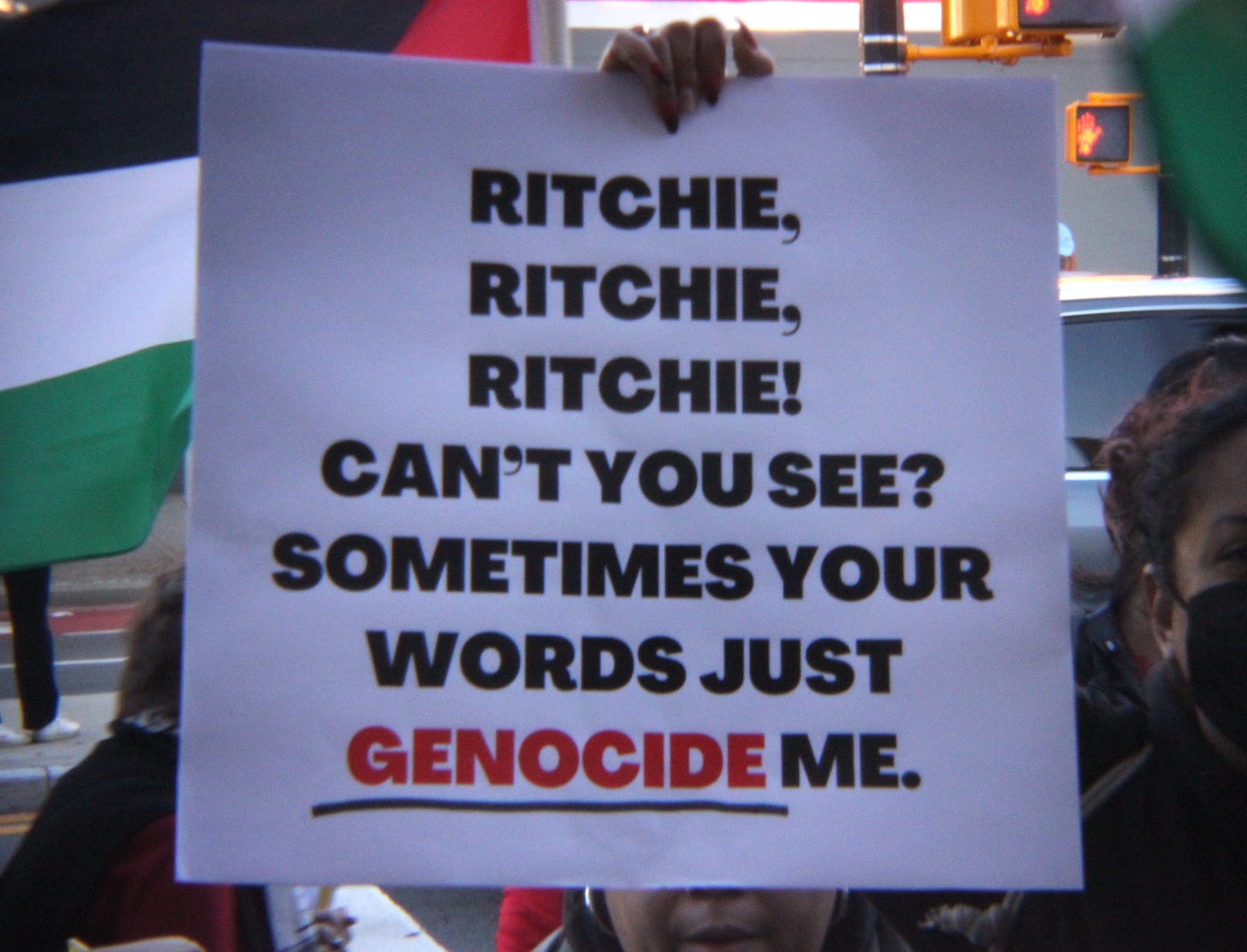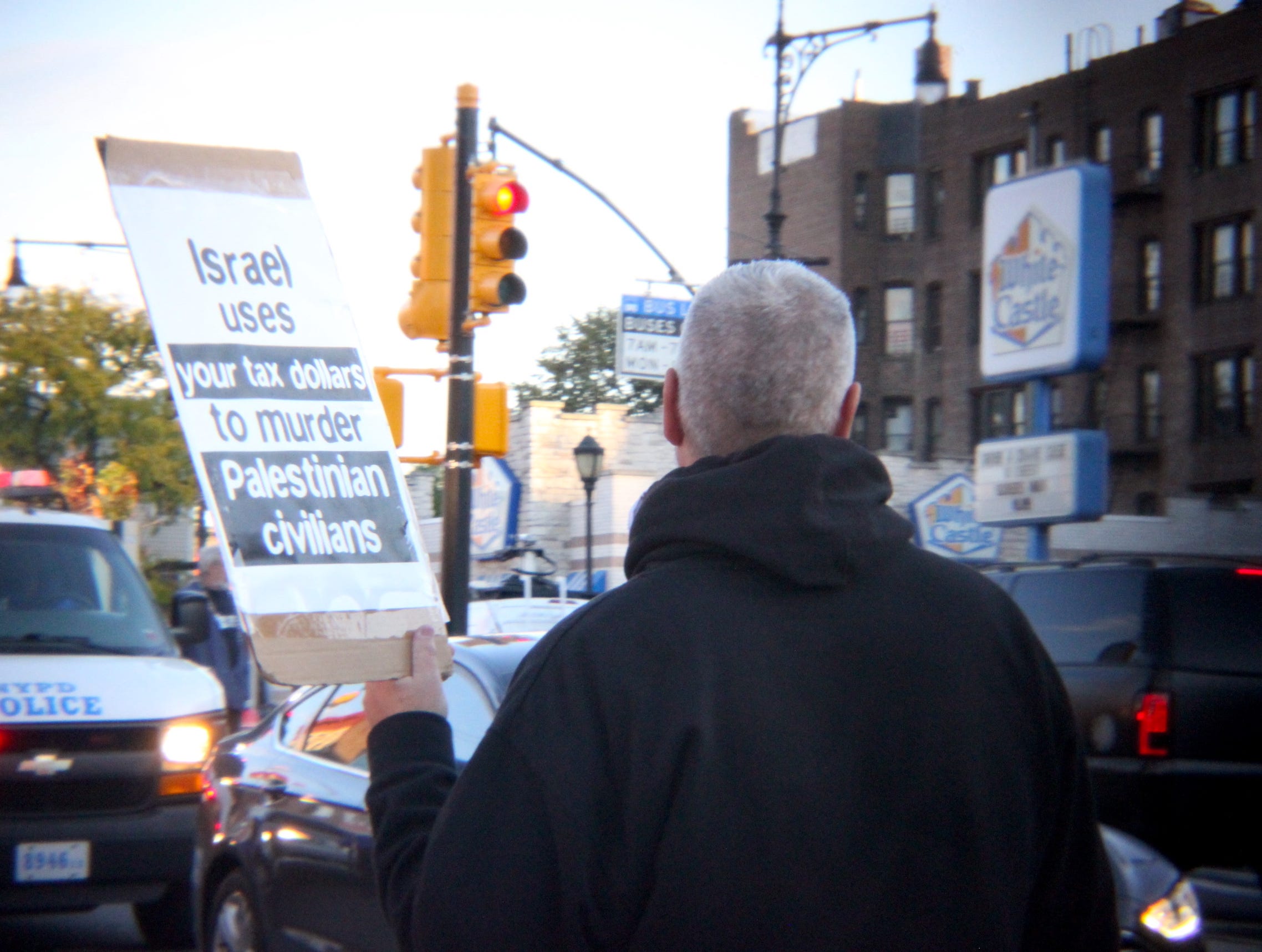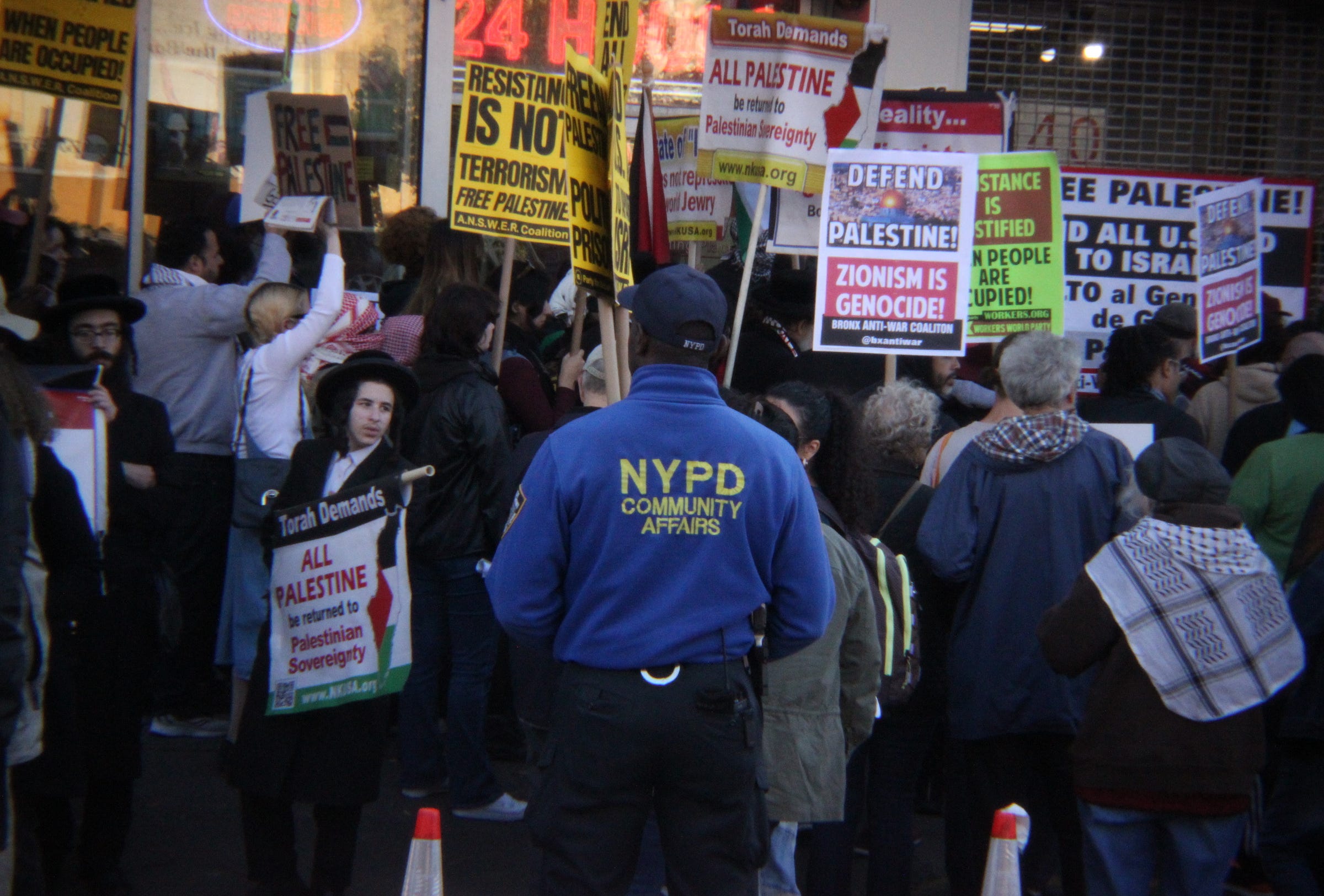
The Israeli apartheid state continues its violence against Palestinians.
They continue kidnapping and torturing women, men, and children. They are committing sexual violence and dropping white phosphorous. They poison and destroy food, water, trees—land.
Since October 7, over 20,000 Palestinians are dead. More than 20,000 children are orphaned. They are cut off from clean water, food, air—land.
The United Nations General Assemly introduced a resolution calling for an immediate ceasefire. Most of the world voted for the measure. The United States voted against it.
Worldwide, people continue fighting for Palestine. England. South Africa. Cuba. Dominican Republic.
Across the country, people are marching in Los Angeles, Chicago, New York City.
Bisan, Motaz, and Plestia are still surviving and reporting. Surviving and reporting and demanding the world bring an end to the daily violence Israel commits against them. At least 60 journalists have been killed since October 7.
Throughout the boroughs, Within Our Lifetime continues to shut down the city.
Other organizations also leading actions include Jewish Voice for Peace, Students for Justice in Palestine, Palestinian Youth Movement, Uptown 4 Palestine, the Bronx Anti-War Coalition, and the Dream Defenders. Last month, the Dream Defenders held an event at the Malcolm X and Dr. Betty Shabazz Memorial and Educational Center. Together, we wrote letters to Palestinians and ate and sang.
In the Bronx, actions are held to protest Rep. Ritchie Torres for accepting money from Zionist organizations. The photos throughout this essay were taken at an October action against Torres.
Following a shutdown of the Williamsburg Bridge on December 4, WOL wrote:
There is no business as usual as our tax dollars continue to fund the horrific genocide of Palestinians in Gaza and all of Palestine. We reject the idea that this is a "war between Israel and Hamas” this is a genocide being carried out by a colonizing entity against the indigenous people of Palestine, facilitated by the largest imperial power the United States. This isn’t a war. It’s a genocide, occupation, siege, and blockade.
We will continue to wake people up to the fact that they are paying for this genocide and that’s why we have to continue to shut things down in NYC as our government continues to provide and fund the bombs and bullets that have taken the lives of over 20,000 Palestinians, 8,000 of them children in the last few weeks alone.
We will not stop, not just until the bombs stop dropping on Gaza but until all U.S. military aid to Israel ends, the siege and blockade ends, and until all of Palestine is free from the river to the sea.
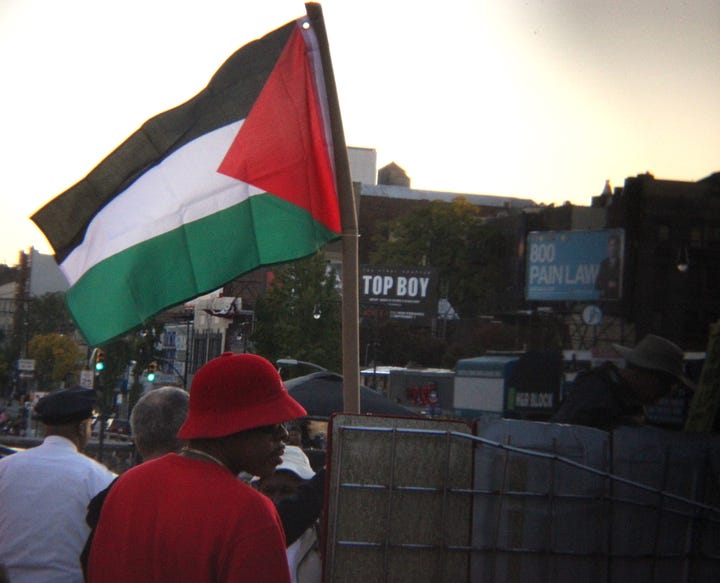
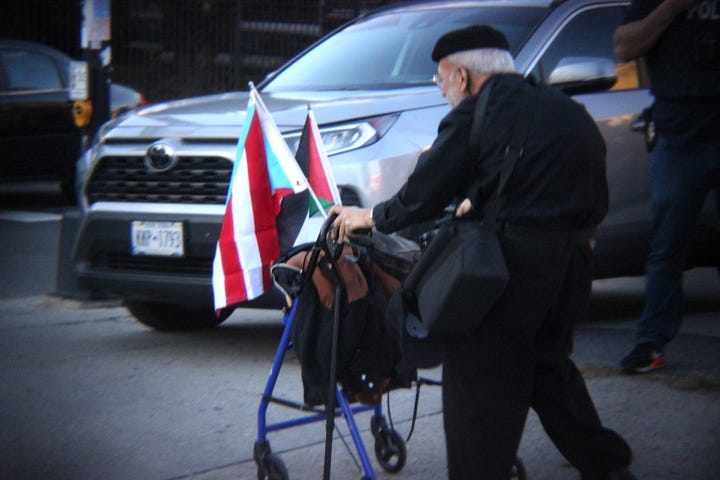
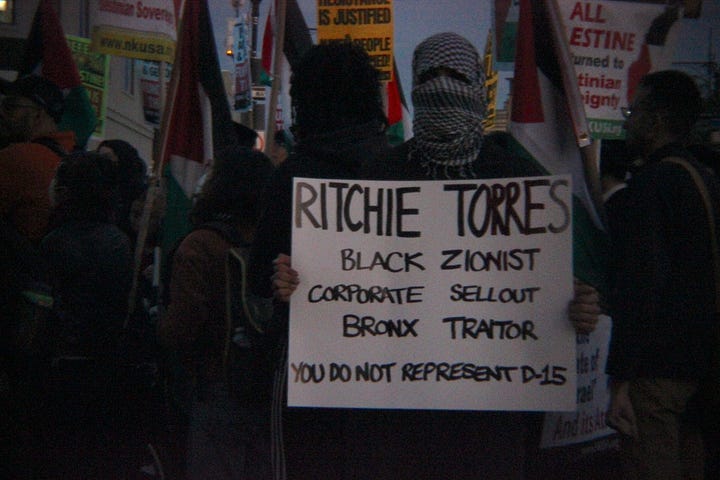
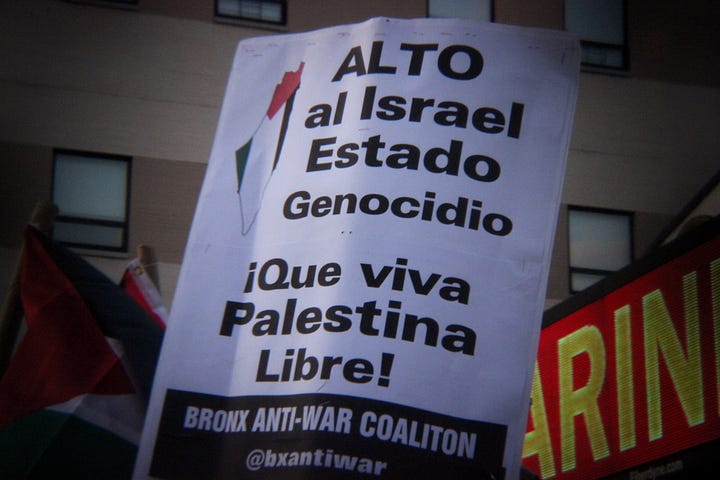
On Haiti
Paramilitary forces in the Dominican Republic are arresting Haitian women, men, and children.
Hospitals are denying care to pregnant women; girls and boys are violently separated from their families and left on streets as their parents are shoved and packed into trucks.
Acción Afro-Dominicana—“agrupación anticolonial q lucha por una Rep. Dominicana más justa, decolonizada, libre de discriminaciones, racismo y fascismo”—condemned the fascism of the Dominican government.
The U.N. voted to send Kenyan police to Haiti, but this decision was halted by Kenya’s court. Despite opposition, Kenya is preparing to send police to Haiti.
Earlier this month, a delegation arrived on the island.
Haitian refugees face foreign-caused insecurity at home, and their attempts to find safety abroad are consistently rejected, often violently, by foreign empires.
The subjugation of the birthplace of the first free Black republic in the Americas is crucial to the geopolitical strategies of countries like France and the United States.
Haitian Women for Haitian Refugees and TakeRoot Justice, on November 22, released a 40-page report, “Humanitarian Parole Crisis: How Racist Policies and Practices Deny Haitian Refugees Work Authorization.”
The report highlights the varied lived experiences of Haitian refugees, “helping us to understand the inequities that mar U.S. immigration policies and practices and impact their lives daily.”
The authors describe an explicit and intentional rejection of the term “migrant,” using “refugee,” citing the ways in which Haitians are left out of the ways foreign governments define aid for this group. I appreciate this report because it helps us to further understand how anti-Haitianismo is legitimized through policy.
From “Humanitarian Parole Crisis”:
The remarkable uprising of the Haitian Revolution, which triumphed over French rule and founded the country as an independent Black republic, was an incredible event that also precipitated decades of backlash from France and other imperial powers, isolating Haiti politically and seeking to destabilize it economically. Policymakers in the United States, entrenched in White supremacy and fearing the prospect of a similar uprising of enslaved Black people in the U.S., participated in these efforts in a variety of ways. After the abolition of slavery in the U.S., policymakers continued to destabilize Haiti by violently occupying the country for nearly two decades, attaching Haiti’s currency to the American dollar, advocating for the amendment of the Haitian Constitution to allow non-Haitians to own land and weakening the Haitian economy in terms of low-wage labor and farming. This hostile posture towards Haiti was also entrenched in immigration policy.
Some questions that come up for me as I am reading the 40-page report:
Which countries give the most “foreign aid” to Haiti?
Is the aid conditional?
What role do our tax dollars play in anti-Haiti foreign policy?
I am starting this monthly (possibly biweekly) news segment to get better at understanding international news.
I want to step outside of my American consciousness.
I want to unlearn and relearn, rooted in understanding the Haitian Revolution, how it connects to my birthplace, to Dominican migration to Manhattan, then the Bronx, and back home and worldwide. How the Haitian Revolution connects to anti-haitianismo we see today.
I want to understand and name how our freedom has always been rooted in the resistance of Haiti. What we see happen to Haitians, including their treatment at U.S. borders, happens to Black people worldwide.
There is a concerted imperial effort to dehumanize Black people in our homelands and abroad.
On Bronx Fires and Collapse
I spent hours last night going through articles, videos, and various fire blogs.
I created the digital map below to gather this data and visualize which Bronx neighborhoods have had the most fires this year, which communities have the fewest fires, and what the most common official reasons are given as causes for fires. (This is not an exhaustive list. Feel free to email any other fires you don’t see listed here that should be included.]
The map includes fires that occurred from January through December of this year.

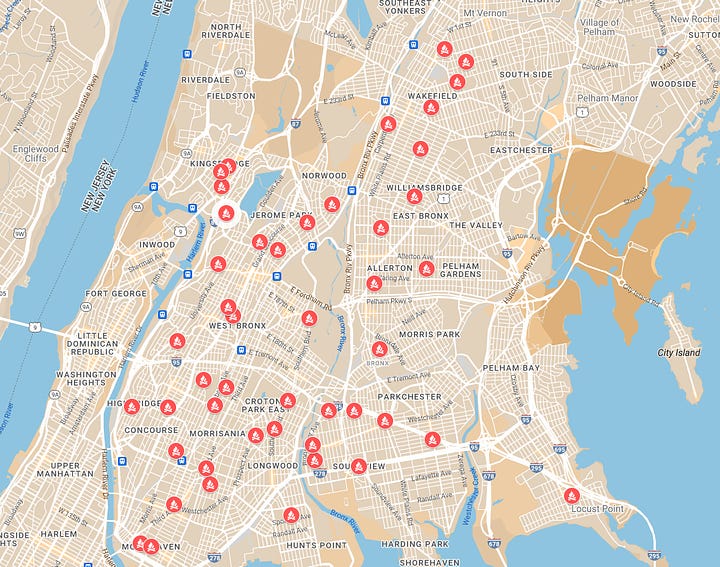
Other New York City and national news
On Dec. 10, a building collapsed in the Burnside neighborhood of the Bronx.
Christine Fields, a 30-year-old Brooklyn mother, died giving birth at Woodhull Medical Center last month. Her family wants to know what happened. She was healthy and scheduled to give birth with her midwife, who was not present. She had an emergency c-section she objected to.
From Latin America and the Caribbean
A tropical disturbance last month left over 1 million people without drinking water in Santo Domingo.
In more than 50 years, “Peru lost more than half of its glacier surface.”
“Honduras: arrest warrant issued over murder of activist Berta Cáceres”
The prime minister of Haiti, Ariel Henry, met with Tony Blair “to discuss the ongoing border dispute with the Dominican Republic.”
From Asia
The World Health Organization released a report on the “reported clusters of respiratory illness in children in Northern China.”
From a friend who traveled abroad: The ecological crisis continues to impact India. Villages experienced hailing.
In Bangladesh, “Garment manufacturers worry a one-sided national vote could lead to economic sanctions for the nation and them.”
From Africa
“Sudan’s war kills over 9,000.” An initiative to highlight the Sudanese genocide began this week. You can follow the Sudan Action Week, including links to activists, historians, and news platforms to follow.
Millions of people are displaced in the Democratic Republic of Congo, “one of the largest internal displacement and humanitarian crises in the world.”
Recommendations
“The Ongoing Battle for Liberation: Time on the Clock of the World” by Shaira Chaer
Valerie Jean-Charles’ “The PR Take”
“Notes on Craft: Writing in the Hour of Genocide” by Fargo Nissim Tbakhi
“The Forgotten Kenya Airlift by Eastern Socialist Countries” by Nicholas Mwangi





